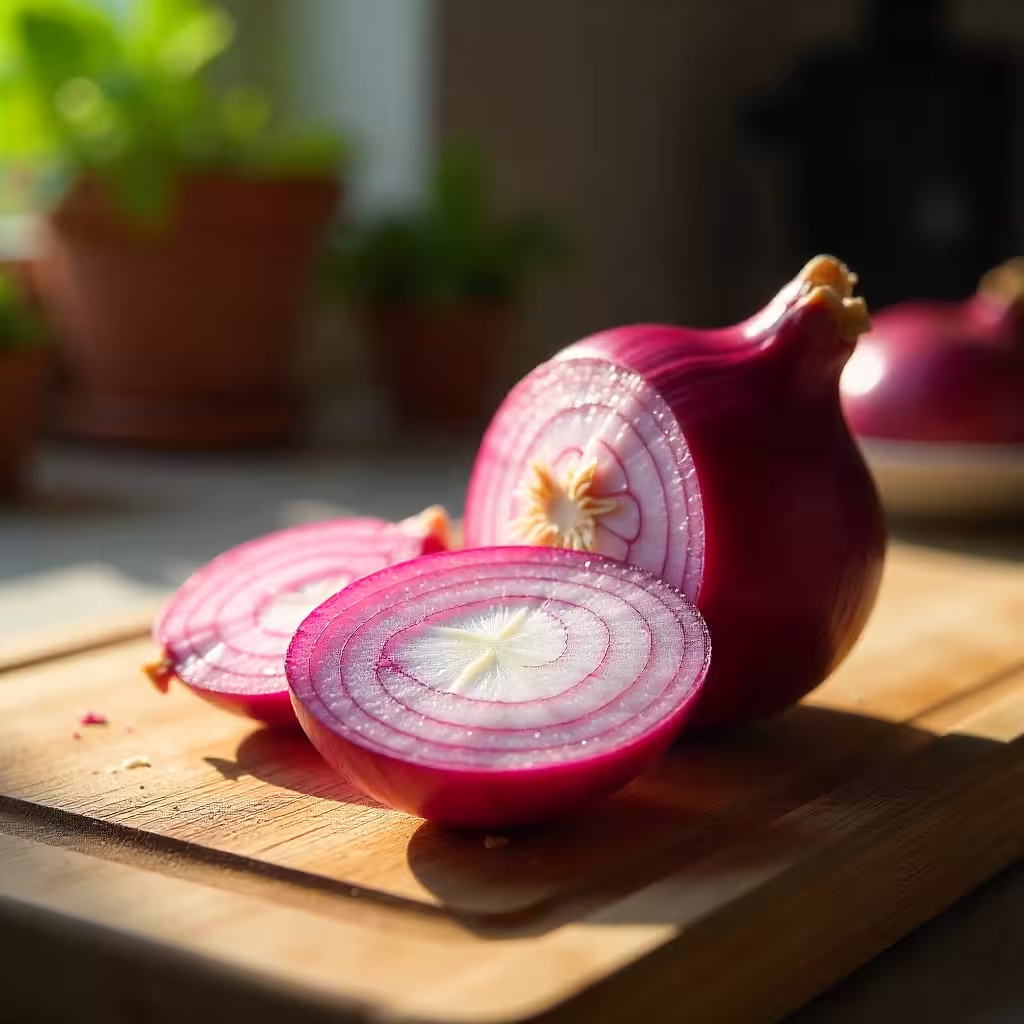Onions: Health Benefits, Preparation, and Digestive Wellness
Onions stand among the world's most powerful medicinal foods, offering extraordinary health benefits that span cardiovascular protection, immune enhancement, cancer prevention, blood sugar regulation, bone health, and antimicrobial action, making them essential components of health-promoting diets across all populations. The health benefits of onions stem from their rich concentration of bioactive compounds including quercetin (a powerful flavonoid antioxidant), sulfur-containing compounds like allicin and diallyl disulfide, vitamin C, B vitamins including folate, chromium, and prebiotic fibers that nourish beneficial gut bacteria. Cardiovascular benefits are among onions' most significant attributes: regular consumption lowers blood pressure by improving endothelial function and promoting nitric oxide production that relaxes blood vessels, reduces LDL cholesterol while increasing HDL cholesterol, prevents dangerous blood clot formation through antiplatelet effects, reduces arterial inflammation and plaque buildup, and decreases overall cardiovascular disease risk by up to 20% according to multiple studies. The quercetin in onions provides potent anti-inflammatory effects throughout the body, reducing chronic inflammation that underlies heart disease, diabetes, arthritis, and many cancers, while also acting as a natural antihistamine that may reduce allergic responses and respiratory conditions. Onions demonstrate remarkable anti-cancer properties, with research showing regular consumption significantly reduces risks of colorectal, stomach, esophageal, and ovarian cancers through multiple mechanisms including inhibiting tumor growth, promoting cancer cell death, preventing DNA damage, and reducing inflammation that can trigger malignant transformation. Blood sugar regulation is another critical benefit: onions contain chromium which enhances insulin function, sulfur compounds that improve glucose metabolism, and quercetin that protects pancreatic beta cells responsible for insulin production, making onions particularly valuable for preventing and managing type 2 diabetes. Bone health benefits emerge from onions' ability to reduce oxidative stress in bone tissue and increase bone density, with studies showing daily onion consumption may reduce osteoporosis risk by over 20%, particularly important for postmenopausal women. The antimicrobial properties of onions combat harmful bacteria including E. coli, Salmonella, and H. pylori, while supporting beneficial gut microbiota through prebiotic fibers that serve as food for probiotics, creating optimal digestive health conditions. Onions support immune function through vitamin C, quercetin, and sulfur compounds that enhance white blood cell activity, reduce infection duration and severity, and may provide protective effects against respiratory infections including influenza. For maximum health benefits, onions should be consumed raw or lightly cooked, as excessive heat destroys some beneficial compounds, though even cooked onions retain substantial health value; red and yellow onions contain higher antioxidant levels than white varieties; and allowing chopped onions to rest for 5-10 minutes before cooking activates enzyme reactions that maximize beneficial compound formation. The exceptional aspect of onions is their universal availability, affordability, cultural acceptance across virtually all cuisines, long storage life without refrigeration, ease of cultivation in diverse climates, and remarkable nutrient density despite low calorie content (only 44 calories per 100 grams), making them one of the most accessible superfoods capable of delivering profound health benefits to populations regardless of economic status, geographic location, or dietary traditions.
Featured Content

Rwandan cuisine already incorporates onions extensively, but optimizing preparation methods can maximize their health benefits while maintaining cultural food preferences and enhancing flavors in traditional dishes. Raw onion preparation delivers maximum health benefits as heat-sensitive compounds like quercetin and sulfur-containing allicin remain intact: Rwandans can finely dice raw onions and add them to fresh salads combining tomatoes, avocados, cabbage, and carrots with lemon juice or vinegar; mix chopped raw onions into cooked beans just before serving, allowing the heat from beans to slightly soften the onions while preserving most beneficial compounds; prepare traditional accompaniments where thinly sliced raw onions are served alongside grilled meat, fish, or isombe (cassava leaves), providing both flavor contrast and health benefits. For cooked preparations that retain substantial health value, Rwandans should employ gentle cooking methods: sauté sliced onions in small amounts of olive oil or vegetable oil over medium heat until translucent but not browned, taking only 5-7 minutes, then add to vegetable stews, bean preparations, or meat dishes; add onions toward the end of cooking rather than at the beginning to minimize heat exposure and nutrient loss; steam or lightly braise onions with other vegetables, preserving their structure and beneficial compounds better than prolonged boiling. Traditional Rwandan preparations can be optimized: when making vegetable sauce (isombe, umuceri, or mixed vegetable dishes), sauté onions briefly then add other ingredients, cooking just until tender; for meat or fish preparations, add sliced onions during the final 10-15 minutes rather than cooking them throughout the entire process; when preparing beans, add diced onions after beans are fully cooked, stirring them in and allowing residual heat to soften them. Rwandans can incorporate more raw onion by developing new habits: adding finely minced raw onions to avocado preparations; mixing diced raw onions with cooked vegetables as a topping; including thin onion slices in sandwiches and wraps; preparing quick-pickled onions by soaking sliced onions in lemon juice or vinegar for 30 minutes, creating a tangy condiment that preserves all health benefits while reducing sharp raw onion bite. Red onions, which contain higher levels of quercetin and anthocyanins, should be prioritized when available in Rwandan markets and used particularly for raw preparations where their color and slightly milder flavor shine. The key principle for Rwandan cooks is remembering that less cooking preserves more health benefits, so incorporating raw onions whenever culturally acceptable and using brief, gentle cooking when heat is necessary ensures maximum cardiovascular, anti-cancer, and immune-supporting benefits while maintaining the familiar flavors central to Rwandan cuisine.
Additional Insights

Onions exert complex and generally highly beneficial effects on digestive health through multiple mechanisms, though individual responses vary and understanding both benefits and potential sensitivities enables optimal use for digestive wellness. The primary digestive benefits of onions come from their prebiotic fiber content, particularly inulin and fructooligosaccharides (FOS), which serve as food for beneficial gut bacteria including Bifidobacteria and Lactobacilli that are essential for digestive health, immune function, nutrient synthesis, and protection against harmful pathogens. Regular onion consumption increases populations of beneficial bacteria, improves the gut microbiome balance, enhances production of short-chain fatty acids (particularly butyrate) that nourish colon cells and reduce inflammation, strengthens intestinal barrier function preventing "leaky gut," and supports optimal nutrient absorption throughout the digestive tract. The antimicrobial compounds in onions, including quercetin and sulfur-containing allicin, selectively combat harmful bacteria like H. pylori (which causes stomach ulcers), E. coli, and Salmonella while generally sparing beneficial bacteria, helping maintain healthy microbial balance and reducing risk of foodborne illness and digestive infections. Onions stimulate production of digestive enzymes and gastric juices that improve food breakdown and nutrient extraction, while their fiber content promotes regular bowel movements, prevents constipation, and supports overall colon health by adding bulk to stool and facilitating efficient waste elimination. The anti-inflammatory properties of quercetin in onions may reduce intestinal inflammation associated with conditions like inflammatory bowel disease, irritable bowel syndrome, and general digestive discomfort, while also protecting the stomach lining from damage. However, onions can cause digestive discomfort in some individuals: the same prebiotic fibers that feed beneficial bacteria also undergo fermentation in the large intestine, producing gas (particularly hydrogen and methane) that causes bloating, cramping, and flatulence in sensitive individuals; people with irritable bowel syndrome (IBS) or small intestinal bacterial overgrowth (SIBO) may experience significant discomfort from onions' FODMAP content (fermentable oligosaccharides, disaccharides, monosaccharides, and polyols); and raw onions are more likely to cause digestive upset than cooked onions as cooking partially breaks down fermentable fibers and sulfur compounds. For individuals experiencing digestive discomfort from onions, several strategies can help: start with small amounts and gradually increase to allow gut bacteria time to adapt; choose cooked onions over raw as cooking reduces FODMAP content and harsh compounds; well-cooked, caramelized onions are generally better tolerated; remove the onion after cooking to impart flavor while minimizing problematic compounds; try green onion tops (scallion greens) which are lower in FODMAPs than bulb onions; or consider onion-infused oils that provide flavor without the fermentable fibers. For most people without specific sensitivities, regular onion consumption significantly improves digestive wellness by supporting beneficial bacteria, enhancing digestive efficiency, protecting against harmful pathogens, reducing inflammation, and promoting regular elimination, making onions valuable additions to gut-health-promoting diets, though individuals with diagnosed IBS, SIBO, or known FODMAP sensitivities should work with healthcare providers to determine appropriate quantities and preparation methods that provide benefits without triggering uncomfortable symptoms.
In-depth Analysis

Rwandan traditional medicine has long recognized onions' therapeutic properties, though systematic documentation and integration with modern evidence-based health practices offers opportunities to expand their use for treating and preventing diseases increasingly affecting Rwandan populations. Traditional Rwandan healers have used onions for generations to treat respiratory infections, applying crushed raw onions mixed with honey to soothe coughs and reduce congestion, a practice now validated by research showing onions' antimicrobial compounds combat respiratory pathogens while their anti-inflammatory effects reduce airway inflammation. Rural Rwandans traditionally consumed raw onions with meals as a general health tonic, intuitively recognizing benefits now explained by science—cardiovascular protection, immune enhancement, and antimicrobial action—though this knowledge often competes with modern processed food preferences in urban areas. Rwandan health centers and hospitals can integrate onion recommendations into treatment protocols for prevalent conditions: prescribing daily raw or lightly cooked onion consumption for hypertensive patients as evidence-based dietary therapy that lowers blood pressure comparably to some medications; recommending onions for diabetic patients to improve blood sugar control and insulin sensitivity; encouraging onion consumption for patients with high cholesterol as part of comprehensive cardiovascular risk reduction strategies. Community health workers visiting Rwandan households can promote onions for specific health applications: teaching mothers to prepare onion remedies for children's coughs and colds, combining traditional wisdom with hygiene practices; demonstrating how adding onions to family meals protects against foodborne illness through antimicrobial action; explaining how regular onion consumption reduces cancer risk, particularly important as cancer rates rise in Rwanda. Rwanda's growing urban health challenges including hypertension, diabetes, obesity, and cardiovascular disease create urgent needs for accessible dietary interventions, and onions—affordable, locally available, culturally accepted—represent ideal food medicine that addresses multiple conditions simultaneously without pharmaceutical costs or side effects. Health education campaigns broadcast through Radio Rwanda and community radio stations can feature segments on onions' specific benefits for conditions affecting listeners' families, providing preparation tips and traditional recipe adaptations that increase onion content. District hospitals treating chronic disease patients should provide onion preparation handouts in Kinyarwanda explaining how to incorporate therapeutic amounts (equivalent to one medium onion daily) into meals for managing hypertension, diabetes, and high cholesterol. The challenge lies in overcoming perceptions of onions as merely flavor enhancers rather than powerful medicines, requiring consistent messaging from healthcare providers, community health workers, and respected community leaders about their evidence-based health benefits and proper preparation methods that maximize therapeutic value for Rwanda's most pressing health challenges.
Key Highlights

Rural Rwanda possesses ideal conditions for expanding onion cultivation and consumption to simultaneously address agricultural income generation, food security, and prevention of diseases increasingly affecting rural populations including hypertension, diabetes, and infectious diseases. Onions grow successfully across Rwanda's diverse agroecological zones, from lowland valleys to highland hillsides, tolerating the varied rainfall patterns and soil conditions found in rural areas, making them accessible to virtually all rural farming households regardless of location or land quality. Rural Rwandans can easily integrate onion cultivation into existing agricultural practices: planting onions in kitchen gardens near homes where they require minimal space and benefit from household water and organic waste; intercropping onions between rows of beans, maize, or other staple crops, utilizing space efficiently while onions' pest-repelling properties protect neighboring plants; establishing small-scale commercial onion plots on portions of family land, creating cash income opportunities particularly for women who often manage vegetable production. Agricultural extension workers visiting rural communities should emphasize onions' dual value as both income source and health-promoting food, providing improved seed varieties or sets, demonstrating proper spacing and fertilization, and connecting farmers to market opportunities while educating about nutritional benefits. Rural cooperatives can organize collective onion production, bulking quantities for better market prices while ensuring members retain sufficient onions for household consumption and health benefits. The beauty of onions for rural health lies in their perfect storage characteristics—onions cure and store for 3-6 months in simple, ventilated structures without electricity, providing year-round access to their cardiovascular, immune, and digestive benefits even during seasons when fresh produce is scarce. Rural health centers should actively promote onion consumption during patient consultations, particularly for individuals diagnosed with high blood pressure, diabetes, or frequent infections, providing specific guidance on daily amounts and preparation methods while acknowledging onions as affordable medicine accessible through home production. Community health workers conducting household visits can assess onion cultivation and consumption, encouraging families to plant more and use them daily, while demonstrating preparation techniques that maximize health benefits such as raw consumption methods, brief cooking times, and combinations with other health-promoting foods. Rural churches and community gatherings provide platforms for onion health education, with community health volunteers demonstrating preparation while explaining specific benefits for conditions affecting attendees—high blood pressure in middle-aged and elderly members, frequent colds in children, poor digestion in various age groups. Schools in rural areas can incorporate onions in agricultural education programs, with students learning cultivation while teachers explain health benefits, creating knowledge that students carry home to influence family practices. Village savings and loan associations can facilitate onion cultivation by providing small loans for purchasing quality seeds or sets, with health benefits providing additional motivation beyond income generation. The critical opportunity in rural Rwanda involves connecting onions' well-established agricultural presence and culinary acceptance with systematic health promotion that positions them not just as flavoring vegetables but as powerful, locally-produced medicines that prevent and manage diseases increasingly burdening rural health systems, require no prescriptions or pharmacy visits, cost virtually nothing when home-grown, and deliver benefits comparable to pharmaceutical interventions for common conditions like hypertension, making onion cultivation and consumption promotion among the most cost-effective health interventions available to rural Rwandan communities.
Final Thoughts

Onions provide targeted therapeutic benefits for specific health conditions increasingly prevalent in Rwanda, and healthcare providers can offer practical guidance for using onions as evidence-based dietary interventions that complement medical treatments while being accessible and affordable for all Rwandans. For hypertension, which affects 15-20% of Rwandan adults and is often poorly controlled due to medication costs and adherence challenges, consuming one medium raw or lightly cooked onion daily (approximately 100-150 grams) can reduce systolic blood pressure by 3-7 mmHg and diastolic pressure by 2-5 mmHg within 8-12 weeks, comparable to low-dose blood pressure medications; Rwandans with hypertension should add finely diced raw onions to salads, beans, or vegetables daily, or consume lightly sautéed onions with meals, while continuing prescribed medications and monitoring blood pressure regularly. For type 2 diabetes and prediabetes, onions improve insulin sensitivity and reduce blood sugar spikes after meals through chromium and sulfur compounds; diabetic Rwandans should consume onions with starchy foods like rice, potatoes, or ugali to blunt glucose elevation, preparing onions raw or lightly cooked to preserve beneficial compounds, with daily consumption of one onion potentially reducing fasting blood sugar by 5-10% over several months. For high cholesterol affecting increasing numbers of urban and rural Rwandans, regular onion consumption lowers LDL cholesterol by 5-15% while raising beneficial HDL cholesterol; individuals with elevated cholesterol should consume at least one raw or lightly cooked onion daily, ideally red onions which contain higher quercetin levels, combined with other heart-healthy foods like avocados and olive oil for synergistic benefits. For frequent respiratory infections common among Rwandan children and adults, onions' antimicrobial and immune-enhancing properties provide protection; families should ensure children consume onions regularly in meals, while preparing traditional onion-honey mixtures for treating active coughs and colds by crushing raw onions, mixing with honey, and giving children one teaspoon several times daily. For digestive complaints including constipation, irregular bowel movements, and mild inflammatory conditions, onions' prebiotic fibers and anti-inflammatory compounds promote digestive wellness; affected individuals should start with small amounts of cooked onions and gradually increase as tolerance develops, working up to one onion daily to establish healthy gut bacteria populations and regular elimination patterns. For cancer prevention, particularly colorectal and stomach cancers rising in Rwanda, consuming onions at least 5-7 times weekly reduces risk by 15-20% through antioxidant, anti-inflammatory, and direct anti-cancer mechanisms; all Rwandans should incorporate onions into daily meals as preventive medicine, with those having family cancer histories making special efforts to consume onions regularly. Healthcare providers in Rwanda should systematically prescribe onions as adjunct therapy, providing written instructions in Kinyarwanda specifying preparation methods, quantities, and expected benefits, while emphasizing that onions complement rather than replace necessary medications, positioning dietary interventions as integral to comprehensive disease management rather than alternative medicine, and leveraging onions' affordability, availability, and cultural acceptance to improve health outcomes across economic strata.















